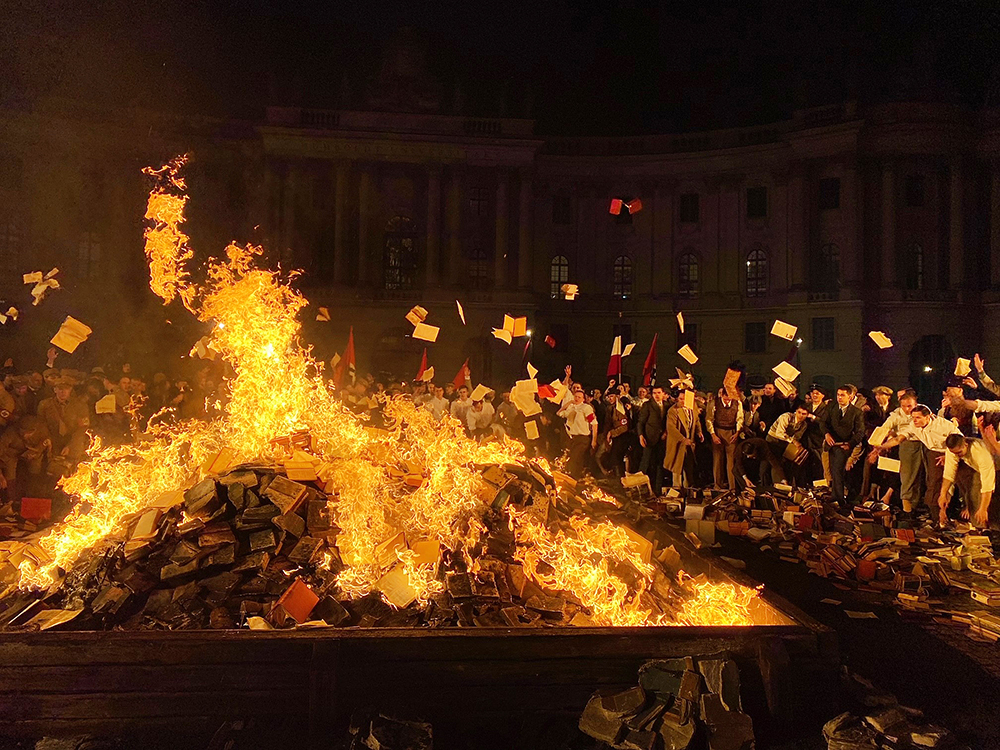In 1915, D.W. Griffith’s The Birth of a Nation revolutionized film. It became the first big crowd-pleasing blockbuster by basically inventing the modern chase scene. Covering the Civil War and Reconstruction in its epic three-hour length (it was also the longest American film to date), the adaptation of Thomas Dixon’s The Clansman is horrifically racist in its depiction of Black Southerners and glorification of white supremacy and the Ku Klux Klan. Even as the film was raking in the dough at the box office, its blatant racism was called out by everyone from the NAACP to The New Republic.
Griffith responded to his critics with his next film. Intolerance was another three-hour epic which pushed at the boundaries of the form — this time by crosscutting between four stories from four different time periods, each about a different historical tragedy brought about by hate. Griffith’s response to his critics was not so much an apology as an observation: “Everybody hates for different reasons.”
It is ironic that, more than a century later, director Ava DuVernay would use the same technique as Griffith in a film that tries to place the American experience of racism into the larger context of world history and anthropology. In Origin, she weaves together stories from contemporary America, the Jim Crow South, Nazi Germany, and colonial India, trying to find the commonalities. These stories are recounted in the 2020 book Caste: The Origins of Our Discontents by Isabel Wilkerson; the film is the dramatized story of the writing of the book. Aunjanue Ellis-Taylor stars as Wilkerson, who became the first Black woman to win a Pulitzer Prize in 1993. (In more Griffith-related irony, Ellis-Taylor also starred in Nate Parker’s 2016 film about the Nat Turner slave rebellion, The Birth of a Nation.)
When we meet Isabel, she’s trying to find her mother (Emily Yancy) an assisted-living facility and figure out what to do with the house she grew up in. Her husband Brett (Jon Bernthal) is a great help to her, even as they navigate the tricky social ins and outs of an interracial marriage. Meanwhile, the editor of The New York Times opinion page (Blair Underwood) is trying to get her to write about the Trayvon Martin killing, which was then fresh in the headlines. When her husband dies suddenly, Isabel deals with her grief by throwing herself into a new book, which neither she nor her agents or editors really understand.
Wilkerson’s book was a huge bestseller in the wake of the Black Lives Matter summer and seriously engaged with scholarship studying oppression around the world. It identifies eight “pillars of caste,” including the belief that the oppressive social order is the will of god and that the upper castes are “pure” and must be protected from contamination by the impure lower castes.
The problem DuVernay has as a filmmaker is that her subject is nonfiction, and heavy with sociological theory. Her solution is to smuggle the ideas in through Isabel’s personal melodrama like a science-fiction writer smuggles ideas with spaceships and lasers. We learn the history of liberationist Dr. B. R. Ambedkar by traveling to India with the writer and visiting his museum, for example. It doesn’t always work. At times, I felt like Caste would have been better served with a documentary series that explored each of the pillars in turn. In the last third of Origin, Isabel breaks out the whiteboard to help explain her theories, and we sit in on documentary-style interviews with both scholars and ordinary people. Four-time Tony winner Audra McDonald shines in one interview as a Black woman whose father named her “Miss” so white people would be forced to use a term of respect. These are the film’s most compelling and memorable moments.
Even with the attempts to make its message more palatable, Origin does not shy away from the big picture. The script even engages with the biggest critique of Caste when a German Marxist (Connie Nelson) points out that the origin of American racism was in service of capitalist exploitation of free labor, while Nazis sought to completely exterminate their out-caste group, the Jews of Europe. Wilkerson and DuVernay argue that even though people might think their hate is unique, in the end, it all looks the same.
Origin
Now playing
Multiple locations
